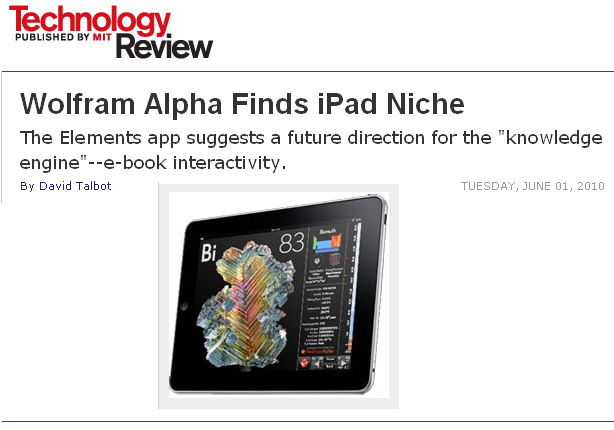Last May, the talk of the search world was Wolfram Alpha, the online engine that provides graphically presented answers to computationally oriented questions tapping myriad math, science, and other data sets. But by April 2010, Wolfram Alpha’s traffic hovered below the numbers achieved in the launch month of May 2009. Though this does not capture use by third-party applications–including Microsoft’s Bing search engine–Wolfram Alpha hasn’t emerged as a notable search destination.
But the emergence of e-books provides Alpha with a new outlet–as a ready-made supplier of interactive graphics, plots, charts, and real-time data. These features can be incorporated within publications developed for Apple’s iPad and other devices. “Deeper information becomes available by way of tapping,” (emphasis DSC) says Theodore Gray, cofounder of Wolfram Research.
The first example is now out: a Wolfram/Alpha app for The Elements, a book Gray wrote on the periodic table. The paper version of the book is dominated by glossy photos of elements and products made from them (Pepto-Bismol, for example, uses bismuth). The version developed for the iPad, however, is chock-full of on-screen buttons that lead to Wolfram’s online computational engine and data sets.
Clearly, the concept will make sense for some kinds of books more than others, says Jared Spool, CEO of User Interface Engineering, a North Andover, MA-based consulting firm. “It makes a lot of sense for a lot of college textbooks to go in this direction, (emphasis DSC) but I’m not sure that a detective novel has a lot to offer there,” he says. Delivering such interactivity is a likely new direction for Wikipedia and search engines and many other sources beyond Wolfram Alpha, he points out.









